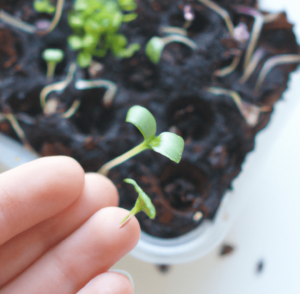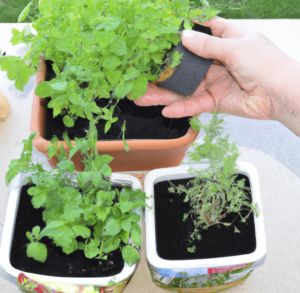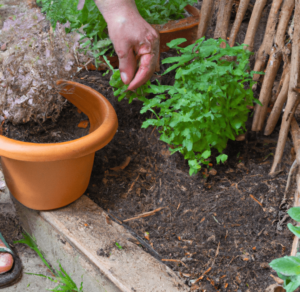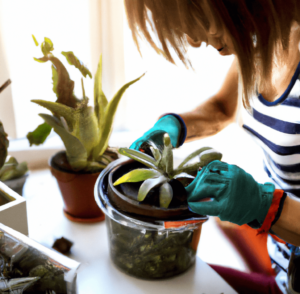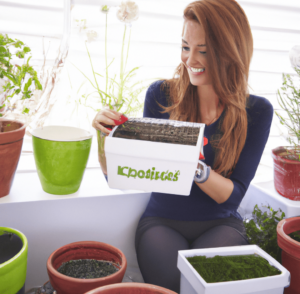Gardening is a fantastic hobby that provides a sense of accomplishment and satisfaction. Whether you’re starting a vegetable garden or planting flowers, choosing the right garden tools for beginners is essential for success. Garden design, soil type, and personal preferences all play a role in determining the tools you need, but as a beginner, it can be overwhelming to know where to start. In this article, we will focus on the essential garden tools that every beginner should have and how to choose them. From digging and planting to pruning and the importance of garden maintenance, we’ll cover everything you need to know to create a beautiful and thriving garden.
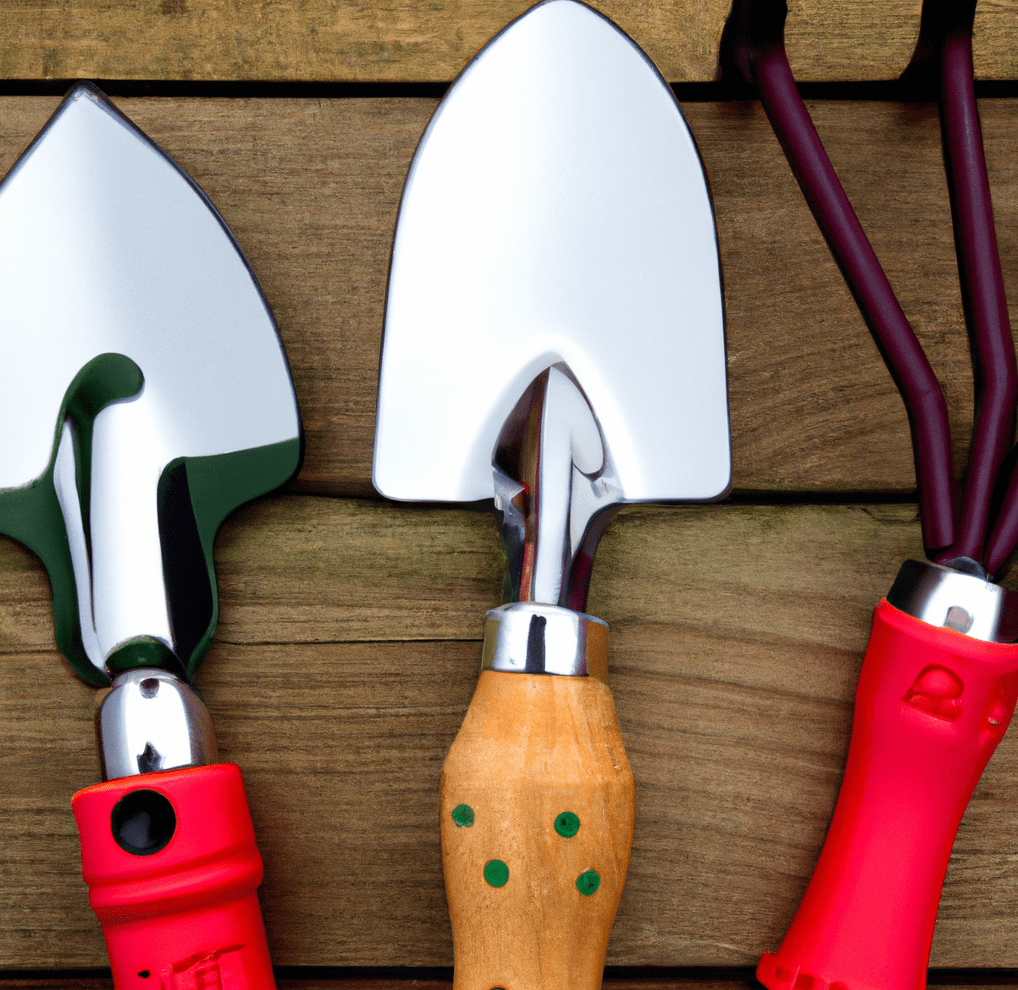
Basic Hand Tools
Choosing the right garden tools for beginners makes the activity so much easier, more successful, and more enjoyable. Here are some basic hand tools that you will need for garden design and gardening:
- Shovel and spade: Used for digging, planting, and moving soil and other materials.
- Rake: Used for leveling soil, removing leaves, and smoothing surfaces.
- Pruning shear: Used for trimming and shaping plants and shrubs.
- Trowel: Used for digging small holes and planting bulbs and seedlings.
- Hand cultivator: Used for breaking up soil and removing weeds.
- Trowel: A trowel is a small hand-held tool with a pointed, scoop-shaped blade. It is used for digging holes and planting seeds, bulbs, and small plants.
- Pruners: Pruners are used for cutting and trimming branches, twigs, and stems. They come in different shapes and sizes and are essential for maintaining your garden and keeping it looking neat.
- Weeder: A weeder is a tool that helps remove unwanted plants and weeds from your garden. It has a forked head that makes it easy to dig into the soil and extract the weed.
Whether you are a professional landscaper or a home gardener, these basic hand tools are a must-have for any garden toolkit.
Pros and Cons of Each Type of Hand Tool
As you’re choosing the right garden tools for beginners, think about the pros and cons of each:
Shovel and spade:
- Pros: Ideal for digging and moving soil, efficient for larger tasks.
- Cons: Can be heavy and difficult for smaller jobs, not ideal for precision tasks.
Rake:
- Pros: Great for removing leaves, smoothing soil, and leveling surfaces.
- Cons: Not ideal for digging or planting, may not be as durable as other tools.
Pruning shears:
- Pros: Essential for trimming and shaping plants, great for precision tasks.
- Cons: Not ideal for larger jobs, can be costly for high-quality shears.
Trowels:
- Pros: Ideal for small planting tasks, useful for digging small holes.
- Cons: Not ideal for larger jobs, may not be as durable as other tools.
Hand cultivators:
- Pros: Great for breaking up soil and removing weeds, efficient for small jobs.
- Cons: Not ideal for larger tasks, may not be as durable as other tools.
How to Choose the Right Hand Tools for Your Specific Gardening Needs
Gardening tools come in a variety of shapes, sizes, and materials, and choosing the right garden tools for beginners can be intimidating but keep these in mind:
- Garden Size: The size of your garden will impact the tools you need. For example, if you’re using mulch in your garden for a lot of vegetables, you may need a more robust trowel and pruner than if you have a small balcony garden.
- Gardening Goals: Your gardening goals will also play a role in the tools you choose. For example, if you plan to grow a vegetable garden, you may need a hoe or cultivator to prepare the soil. If you plan to grow flowers, you may want a specialized trowel or transplanter for planting.
- Soil Type: The type of soil in your garden will impact the tools you need. If you have heavy clay soil, you may need a heavy-duty trowel and cultivator to break up the soil. If you have sandy soil, a lighter tool may be all you need.
- Personal Preferences: consider your personal preferences when choosing garden tools. Do you prefer wooden or plastic handles? Do you want a set of matching tools, or are you happy with a variety of styles and materials?
Choosing the right garden tools for beginners is a lot easier when you think about how you’re using a product.
Power Tools
Power tools can be an essential component of garden design and gardening, providing a quick and efficient means of completing tasks that would otherwise be difficult or time-consuming to do by hand.
These tools are designed to handle the heavy-duty tasks required in a garden, making it easier for gardeners to achieve the results they need. Whether it is pruning, cutting, digging, or planting, there is a power tool designed specifically to help with the job. In garden design and gardening, it is important to choose the right tool for the job. You can consider the following as you’re choosing the right garden tools for beginners:
- Lawnmower: A lawnmower is a powerful tool used to cut grass in a garden. They come in various sizes and can be powered by gas, electricity, or batteries. Lawnmowers make it easy to keep a lawn in good condition, and they come in various styles, including manual push mowers, riding mowers, and reel mowers.
- Hedge trimmer: A hedge trimmer is a tool used to trim and shape shrubs and hedges in a garden. They come in various sizes and can be powered by gas, electricity, or batteries. Hedge trimmers are an essential tool for maintaining a well-manicured garden.
- Leaf blower: A leaf blower is a powerful tool used to clear leaves and other debris from lawns and gardens. They can be powered by gas or electricity and are available in various sizes and styles. Leaf blowers make it easy to keep a garden free of debris, saving time and effort.
These are just a few of the garden tools that you can buy to make things a little easier.
Pros and Cons of Each Type of Power Tool
Again, each have its pros and cons which you learn more about in a gardening guide:
Lawnmower :
- Pros: A lawnmower is a fast and efficient way to cut grass. They are also great for maintaining a neat and tidy lawn.
- Cons: Lawnmowers can be loud, heavy, and expensive. They also require regular maintenance and may not be suitable for all types of soil.
Hedge Trimmer:
- Pros: A hedge trimmer is a fast and efficient way to trim and shape hedges and shrubs. They are also great for maintaining a neat and tidy garden.
- Cons: Hedge trimmers can be loud, heavy, and expensive. They also require regular maintenance and may not be suitable for all types of plants.
Leaf Blower
- Pos: A leaf blower is a fast and efficient way to remove leaves, grass clippings, and other debris from your garden.
- Cons: Leaf blowers can be loud, heavy, and expensive. They also require regular maintenance and may not be suitable for all types of debris.
When choosing power tools for gardening, it’s important to consider your specific needs and budget. High-quality power tools may be more expensive upfront, but they will last longer and be more efficient in the long run. On the other hand, cheaper power tools may be more affordable upfront, but they may not last as long and may not perform as well. These are a grew things to think about as you’re choosing the right garden tools for beginners.
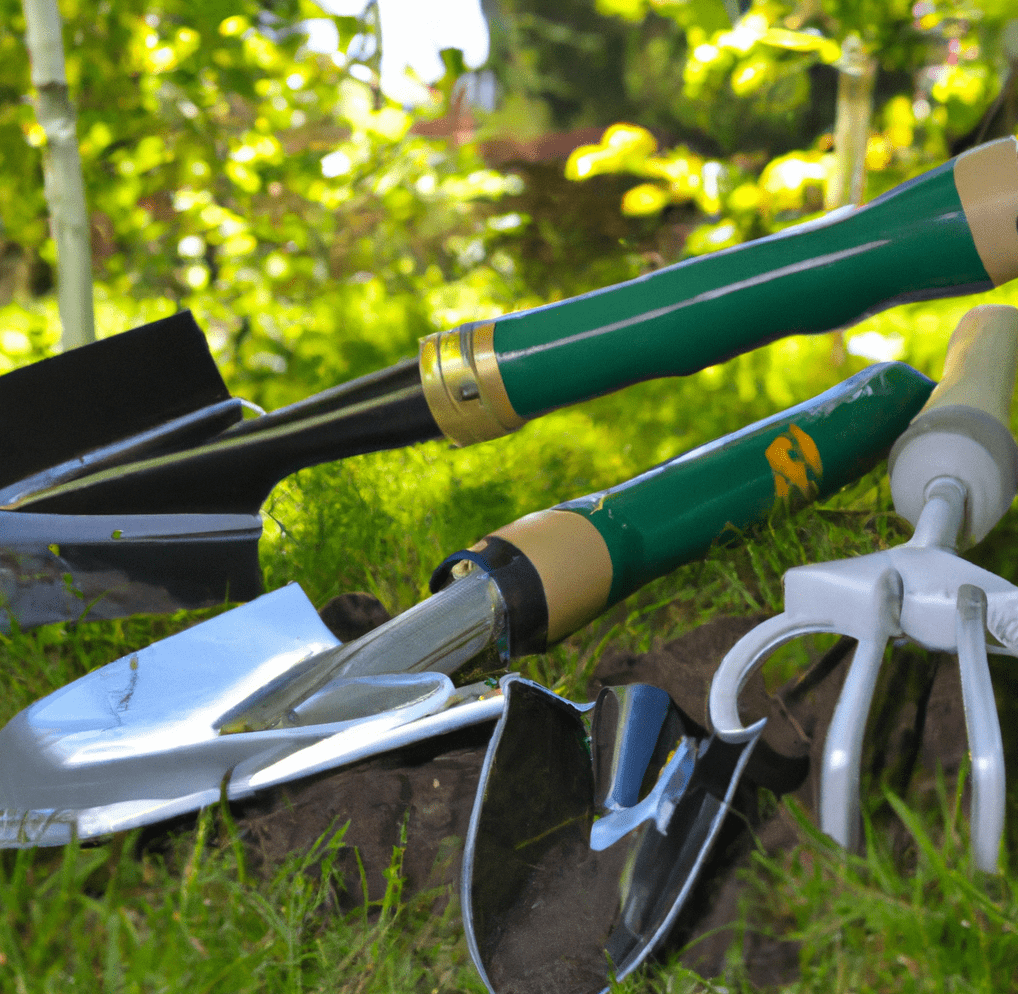
How to Choose the Right Power Tools for Your Specific Gardening Needs
Similar to choosing the right garden tools for beginners, you can consider the following for power tools:
- Garden Size: The size of your garden will play a big role in determining the type of power tool you need. Larger gardens may require larger tools with more power, while smaller gardens may only need a lighter and more compact tool.
- Type of Plants: Consider the type of plants you will be working with. Some power tools may be better suited for working with woody plants, while others may be better for working with soft and delicate plants.
- Tasks: Determine the specific tasks you will be completing in your garden, such as pruning, digging, or planting. This will help you select the power tool that is best suited for the job.
- Budget: Power tools can range in price from a few dollars to several hundred dollars. Determine your budget and choose a tool that fits within it, but also keep in mind the importance of quality and durability when making your decision.
- Safety Features: Consider the safety features offered by the power tool, such as anti-vibration handles, safety switches, and locking mechanisms. These features can help prevent accidents and injuries while using the tool.
Tool Maintenance
Gardening is a rewarding and fulfilling hobby, but it’s important to keep your tools in good condition to make the job easier and more enjoyable after you’ve learned about choosing the right garden tools for beginners. In general:
- Clean your tools after each use: Wipe down your tools with a damp cloth to remove dirt and debris. This will prevent rust from forming and prolong the life of your tools.
- Store your tools in a dry place: Moisture is the enemy of garden tools, so store them in a dry, well-ventilated area to prevent rust and corrosion.
- Sharpen your tools regularly: Dull tools are less effective and can damage your plants. Sharpen your tools regularly to keep them in good working order.
- Weeding: Weeding can be one of the most time-consuming tasks in gardening, but having sharp tools makes the job much easier. Make sure your weeding tools are clean and sharp before you start.
- Oil moving parts: To keep your tools functioning smoothly, oil any moving parts, such as the joints of your pruning shears or the gears of your cultivator. Use a light machine oil, and apply it sparingly to avoid attracting dirt and debris.
- Repair or replace damaged tools: If you notice any damage to your tools, such as a broken handle or a bent blade, repair or replace the tool as soon as possible. Damaged tools can be dangerous to use and can cause further damage to your garden.
By following these simple steps, you can keep your garden tools in top condition and enjoy a more productive and efficient gardening experience.
How to Identify and Fix Common Problems With Tools
After choosing the right garden tools for beginners, you might have problems with them from time to time:
- Dull blades: Dull blades on hand pruners or spades can make it difficult to cut through tough soil or branches. To sharpen the blades, use a sharpening stone or file and follow the manufacturer’s instructions.
- Loose handles: Loose handles can make it difficult to grip and control the tool. To fix this, tighten any screws or bolts that hold the handle in place.
- Rust: Rust can weaken the metal components of the tool and make it difficult to use. To remove rust, use a wire brush or sandpaper and apply a rust inhibitor to prevent future rusting.
- Bent or broken tines: Bent or broken tines on a soil fork can make it difficult to turn the soil. To fix this, straighten the tines as much as possible or replace them if they are severely damaged.
Safety
Now that you know about choosing the right garden tools for beginners, you need to safely use them too. Garden tools, such as shears, cultivators, and hoes, are designed to make gardening tasks easier and more efficient. However, they also have the potential to cause injury if used improperly. For example, a dull blade can cause you to apply more force than necessary, increasing the risk of an accidental injury.
In addition to protecting your own safety, using garden tools safely is also important for maintaining the health and beauty of your garden. For instance, if you’re using pruning shears to cut back shrubs, it’s important to make clean cuts to avoid damaging the plant and promoting disease. Keep these tips in mind:
- A well-designed garden layout can also help reduce the risk of injury by making it easy to move around and access plants and garden features.
- Choose tools that are designed specifically for the task at hand. This will help reduce the risk of injury from slips, cuts, and electrical shock.
- Opt for quality tools that are well-made and well-maintained. Poorly made tools can malfunction and cause injury.
- Make sure that all electrical tools are properly grounded and that the cords are in good condition. Frayed or damaged cords can be a source of electrical shock.
- Store sharp tools such as pruning shears and garden knives in a secure place to prevent cuts and other injuries.
- Read the instructions and safety guidelines for all tools before using them. This will help you understand how to use them safely and effectively.
By following these tips, garden enthusiasts can minimize the risk of injury and enjoy the many benefits of gardening.
How to Properly Store and Transport Your Tools
Now that you’re pretty well-informed in choosing the right garden tools for beginners, here’s how to store and transport your tools:
- Clean your tools after each use and dry them thoroughly to prevent rust and other forms of corrosion.
- Store your tools in a dry place, such as a shed or garage, to protect them from moisture and harsh weather conditions.
- Consider investing in a sturdy tool rack or shelving unit to keep your tools organized and easily accessible.
- Wrap the blades of your tools in a protective material, such as oiled cloth or plastic, to prevent damage during transportation.
- When transporting your tools, use a durable toolbox or bag that provides enough padding and protection for your tools.
Bottom Line: Choosing the Right Garden Tools for Beginners
Choosing the right garden tools for beginners isn’t so scary now! We encourage beginners to start maintaining their gardens and to take advantage of the many benefits that come with proper garden maintenance. Whether you are a seasoned gardener or a beginner, there are many resources available to help you achieve your gardening goals, including websites, books, and magazines. With the right tools and some care and attention, you can turn your garden into a beautiful, healthy, and thriving space.
Choosing the Right Garden Tools for Beginners FAQs
What fundamental hand tools are required for beginning gardeners?
Rakes, pruning shears, trowels, shovels, and hand cultivators are among the most important hand tools for novice gardeners. These implements are used for weeding, planting, raking, trimming, and removing leaves.
What are the uses of a trowel in gardening?
A trowel is a tiny hand-held tool with a blade shaped like a scoop. It is utilized to plant seeds, bulbs, and small plants as well as to dig holes.
What gardening tasks call for the usage of pruners?
Branches, twigs, and stems are cut and trimmed with pruners.
What does a weeder do in a garden?
A weeder is a tool that aids in clearing your garden of unwanted plants and weeds. Its forked head makes it simple to dig into the ground and remove weeds.
What advantages and disadvantages do shovels and spades have in gardening?
The benefits of spades and shovels are ideal for moving soil, digging, and are effective for bigger jobs. On the other hand, a spade or shovel may not the best for precise tasks and can be heavy and challenging for smaller jobs.
What are the advantages and disadvantages of rakes in gardening?
Rakes are excellent for clearing away debris, taming rough terrain, and leveling surfaces but may not be as sturdy as other tools, and not good for planting or digging.
What are the benefits and drawbacks of gardening pruning shears?
Pruning sheers are essential for shaping and cutting plants; excellent for precise work but aren’t the best for bigger projects, and high-quality shears can be pricey.
What are the benefits and drawbacks of gardening trowels?
These are ideal for making small planting holes and planting tasks but not the best for bigger jobs, and perhaps not as strong as other tools.
What benefits and drawbacks do hand cultivators in gardening offer?
Hand cultivators are effective for small jobs, and great for weed removal and soil aeration. However, it may not be as durable as other tools, and it is not appropriate for larger tasks.
How will you know you’re choosing the right garden tools for beginners?
Take into account the size of your garden, your gardening objectives, the type of soil in your garden, and the kinds of plants you intend to grow when selecting the appropriate hand tools. Additionally, search for high-quality tools with sturdy blades and ergonomic handles.
How can I take care of my garden tools so they work better and last longer?
In order to keep your garden tools in good condition, you should clean them after each use, store them in a dry location, regularly sharpen them, and make sure weeding tools are clean and sharp before using them.


